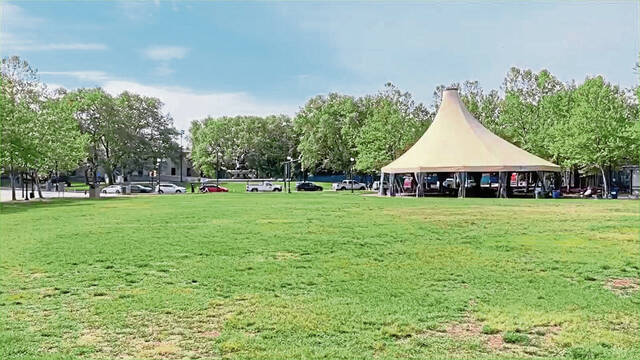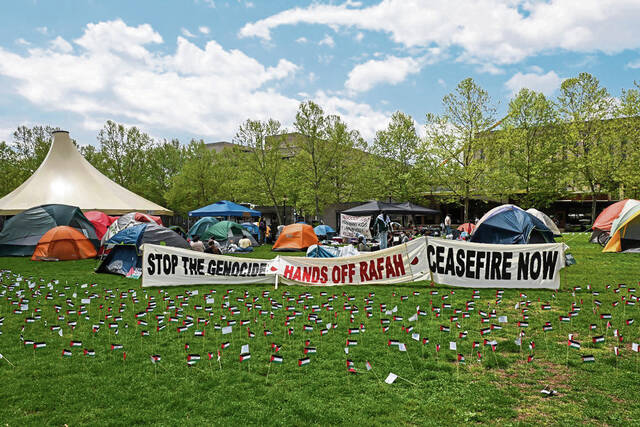Encampment is gone from Schenley Plaza in Oakland

After a week of protests, Schenley Plaza in Oakland was cleared of a pro-Palestine encampment on Tuesday.- Megan Swift | TribLive

An encampment is seen at Schenley Plaza in Oakland on the second day of a pro-Palestine demonstration Wednesday, April 24, 2024.- Kristina Serafini | TribLive
Protest signs and tents that had punctuated Schenley Plaza were gone by Tuesday, as pro-Palestinian demonstrators ended a weeklong encampment there and briefly on the University of Pittsburgh campus. Since last Tuesday, Pitt students and others had occupied the city-owned Plaza located in the shadow of the Cathedral of Learning, demanding that Pitt divest itself from war-related investments in Israel. The protest, organized by a group calling itself Pitt Divest from Apartheid, was among pro-Palestinian protests that have spread to campuses nationwide in recent days. Before the group left, it issued a statement Monday sharply critical of university leadership, including Pitt Chancellor Joan Gabel, and made demands that included legal amnesty for all protesting students, faculty and staff both now and going forward, and disarming campus police. I’m here at Schenley Plaza in Pittsburgh where the pro-Palestine encampment has ended after a week of protesting. Many participants were Pitt students — and some graduated @TribLIVE pic.twitter.com/J7EJISuKuW — Megan Swift (@mgswift7) April 30, 2024 They say they want transparency from Pitt about its holdings and a statement of support for Palestinians. Protesters at Pitt and at other universities accuse their campuses of supporting genocide by Israel in Gaza. Pitt officials did not immediately respond to requests for comment on Tuesday. The protest began with about 25 demonstrators and grew throughout the week. Two people, at least one a Pitt student, were arrested Sunday evening during a disturbance as protesters left the park and returned to campus. It was the only instance of trouble, unlike protests elsewhere in the country that have led to building occupations and hundreds of arrests. Pitt and city police said protesters reneged Sunday on an agreement to shift their encampment on the Cathedral of Learning Lawn to the plaza. Protest organizers, meanwhile, called the arrests unjustified and wanted Pitt to ask the Allegheny County District Attorney’s office to drop charges. Pittsburgh Police Chief Larry Scirotto said city police, university police, Pitt administrators and the protest organizers were in frequent communication for the duration of the protest. He said police required that protesters agree to several conditions, including that they would not engage in antisemitic speech or behavior; they would not impede traffic that could be going to nearby hospitals; they would not disrupt commencement events; and they would commit no violence or destruction of property. Scirotto said the organizers agreed to those conditions and honored them throughout their event. The group also agreed to vacate the site on Monday. Pittsburgh police helped facilitate the protesters’ request to have "meaningful dialogue” with the university’s top administrators, Scirotto said. "They were satisfied they were being heard to at least take the next step,” he said. Pittsburgh police did not make any arrests during the protest. University police arrested two people. Remove the ads from your TribLIVE reading experience but still support the journalists who create the content with TribLIVE Ad-Free. Get Ad-Free >
